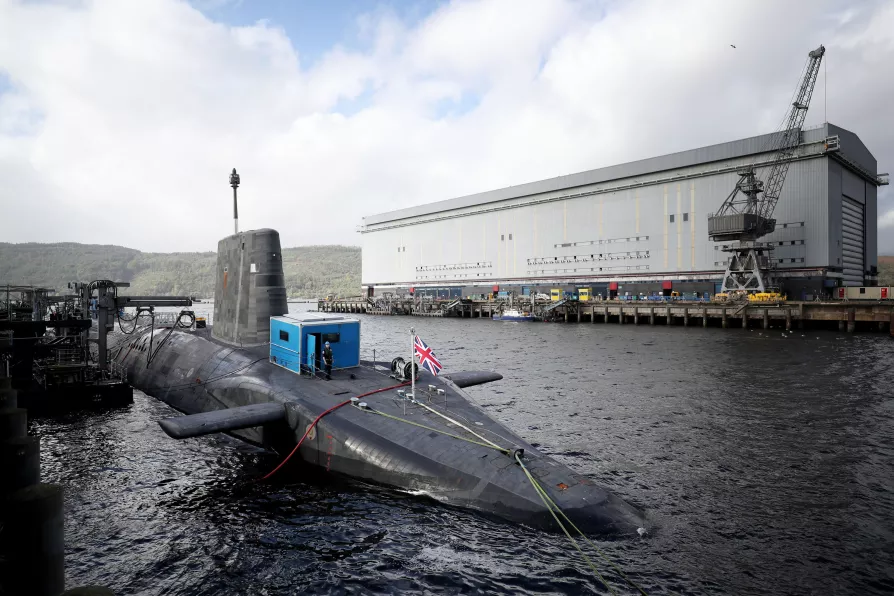
 The Vanguard-class nuclear deterrent submarine HMS Vengeance at HM Naval Base Clyde, Faslane
The Vanguard-class nuclear deterrent submarine HMS Vengeance at HM Naval Base Clyde, Faslane
TOMORROW Nato begins nuclear war drills over western Europe. Exercise Steadfast Noon tests the nuclear capability of non-nuclear weapons states under the US’s “nuclear umbrella,” with Dutch F-35A jets declared “ready to perform nuclear roles” for the first time.
Nato’s aggressive posturing is sparking a new arms race. The US is spending a staggering $1.5 trillion (£1.14tn) on upgrading its nuclear arsenal. Britain too is increasing its stockpile of nuclear weapons.
Russia has revised its protocol on nuclear strikes, announcing it reserves the right to use nuclear weapons in retaliation for a non-nuclear attack.
But it is above all the US which has dismantled barriers to nuclear conflict.
It was the US which tore up the Intermediate Nuclear Forces Treaty, a landmark achievement which saw US and Soviet missiles removed from Europe. Now they are coming back: Russia has deployed them to Belarus, while the US is redeploying them across Europe, including in Germany and Britain.
Europe is already the battlefield for a proxy war between Nato and Russia: these deployments will make it the battleground should that war escalate to direct conflict between nuclear powers.
Nuclear war is also brought closer by the development of lower-yield “tactical” nuclear weapons, again led by the US, which equipped its submarine fleet with such weapons under Donald Trump.
These reduce the threshold for use, leading US and Russian strategists to talk of fighting a limited nuclear war with a supposedly lower risk of mutually assured destruction. Yet they carry all the same costs in terms of radioactive fallout that have poisoned generations.
The consequence of their use would be to end the taboo on using nuclear weapons that has held since their only ever use in war — by the United States against Japan in 1945.
We need to relearn the fear of nuclear conflict that inspired a mass peace movement during the original cold war. Complacency over the continued existence of nuclear weapons rests on the idea that nobody would ever use them: yet the world came alarmingly close to nuclear annihilation at least twice during the original cold war.
Two current conflicts could plausibly spiral into nuclear war: the Nato-Russia proxy war over Ukraine, and Israel’s ever-expanding war against Palestine, Lebanon and increasingly Iran.
Cold war politicians were aware of mass public opposition to use of nuclear weapons. They had also lived through world war, and seen the impact of enemy bombing on cities in their own countries.
Today’s political leaders lack this life experience. The 1980s comedy Blackadder Goes Forth includes a scene where Britain’s naive rush into World War I is explained by its complacency after decades of easy colonial conflicts against vastly inferior opponents.
Since the collapse of the Soviet Union, the US and its allies have fought multiple wars against countries which cannot strike back: Yugoslavia, Afghanistan, Iraq, Libya. This surely explains the blasé attitude to war prevalent among most Western politicians. Yet we are in an age of great power conflict in which world war against countries capable of devastating retaliation is no longer unthinkable.
It must be prevented. The Campaign for Nuclear Disarmament’s The World We Want conference on Saturday was a valuable reminder of that.
Building on the record of retiring CND general secretary Kate Hudson in forging alliances across the peace movement, it brought together campaigners from peace, social justice and environmental causes to debate the drive towards global conflict and what ordinary people can do to stop it.
It is only through such alliances that the vital cause of nuclear disarmament can be placed at the heart of the struggle for a safer world, just as it is only through unity with the left and labour movements that the essential campaigns against environmental degradation, racism and misogyny can develop from single-issue causes into a force that can change the planet.














